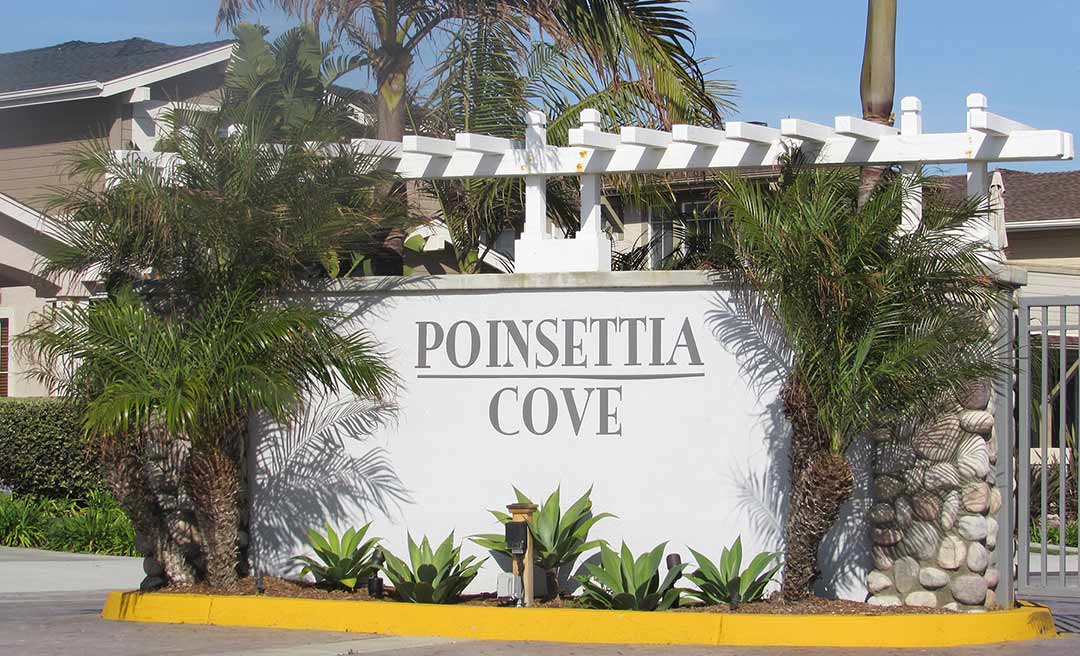CARLSBAD — Recycled water is a long-running point of emphasis for the city.
And at least one local homeowner’s association is attempting to join those efforts. However, the group at Poinsettia Cove has struggled for nearly one year to even get an engineering firm to work with the HOA for a mandatory report on switching water sources to save 4 million gallons of potable water.
Sam Spadaro, who sits on a committee delegated by the HOA board to work the problem, says the group began last spring to switch by retrofitting the water mechanisms.
As part of the project, the HOA wants to install smart meters and water efficient sprinkler heads, which carry a $4 rebate per head.
“We started seeing a lot of lawns being put in,” Spadaro said. “This is raising the visibility of how we are using or misusing water. I became concerned because our front lawns … are being watered by potable water.”
According to Ela Karczewski, assistant engineer for Carlsbad, the city has a program to retrofit meters above ground for irrigation purposes. She said the water meters at the homes in Poinsettia Cove are currently using potable water.
The HOA approached the city on how to retrofit the above ground mechanisms. The state developed strict guidelines for retrofitting, but therein lays the problem, Spardaro said.
Before the city can distribute recycled water, tests must be performed on the coverage of the cross connections, Karczewski said. Plans must first be approved by the Carlsbad Municipal Water District, an engineering report conducted and then submitted to San Diego County and then to the state’s Department of Environmental Health.
The first obstacle, Karczewski said, is the HOA is a dual plumbed site. Since the meters use potable water, there are concerns of possible cross connections mixing potable and recycled water.
Since San Diego County labels the site as a dual plumbed location, it requires an engineering report.
“That is where the problem is,” Karczewski said. “The plans are prepared, but the HOA … they can’t find an engineering firm to prepare the report.”
Compounding matters, Spadaro and Karczewski said, is the cost of the report, which can run up to $15,000.
“It’s like a Catch-22,” Karczewski added. “They can have plans prepared, and the county won’t sign off without the supplemental report.”
Spadaro said his committee has contacted at least seven firms, who all opted against doing the work to provide the reports to the state. He said it becomes a cycle of comments and corrections over and over leading to no action.
An engineer, who spoke on background, said the possibility of being run in circles by the state is what may give firms pause at taking on these types of projects. The source said reports can be easily kicked back with comments and corrections several times, which in turn burns money and time on part of the firms.
By the end of the process, which there is no absolute timeline, could mean a financial drain for the firms. In addition, the source said a power struggle between the state’s Water Resources Board and Department of Water Resources has become toxic.
Another aspect, the source said, is HOA’s are not as powerful as cities or other entities in lobbying efforts.
Karczewski said the Poinsettia HOA was the first to approach the city, but she said another HOA is also attempting to retrofit its water use.
“They are stuck,” she said. “I didn’t realize … how difficult it would be to find a company to do this report. I asked my superiors for names in the industry, and none of these companies are interested in doing a report like this. It is very frustrating to all parties.”
However, Spadaro said an engineering firm in Vista has agreed to work with the HOA. The deal consists of two aspects: First, the firm will perform all work to size the scope of the project and time and materials. Second, pricing and completion of the report will come after the initial survey.
Carlsbad is required to cut 28 percent per month, observing Gov. Jerry Brown’s state mandated water conservation efforts, although the city has only met the standard once. Yet Carlsbad has not been fined because of a 4 percent credit per month allotted by the state.
In addition, cities, such as Carlsbad, have begun to alter water sources for irrigation over the past year. Carlsbad, however, has been a model throughout the state in converting wastewater into recycled water to combat the drought, such as expanding its recycled water plant again.



